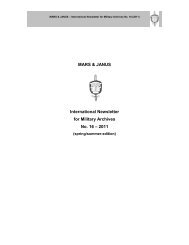National Experiences - British Commission for Military History
National Experiences - British Commission for Military History
National Experiences - British Commission for Military History
You also want an ePaper? Increase the reach of your titles
YUMPU automatically turns print PDFs into web optimized ePapers that Google loves.
92 ai r p o w e r in 20 t H Ce n t u ry do C t r i n e s a n d em p l o y m e n t - nat i o n a l ex p e r i e n C e s<br />
<strong>British</strong> air war doctrine, <strong>for</strong>, after all, the will of the people was given first priority<br />
in a democracy. 14 However, the widespread understanding, which was in line with<br />
the then applicable state of the art of aeronautical engineering, that modern, multiengine<br />
bombers could not be intercepted by the initially much slower single-engine<br />
fighter aircraft but by pure coincidence also played an important role. 15 This expectation<br />
culminated in the well-known sentence uttered by <strong>British</strong> Prime Minister Stanly<br />
Baldwin: „The bomber will always get through“. 16<br />
Trenchard’s air war doctrine, on the one hand, was designed to punish the people<br />
of an enemy nation by attacking their cities with bombers and, on the other hand, to<br />
bomb them to their senses so that they <strong>for</strong>ced their political leaders to stop hostilities.<br />
The question as to whether this strategy would also work with non-democratic,<br />
totalitarian states remained unanswered.<br />
The air war strategy of the United States of America first took a completely different<br />
turn. 17 During World War I, their small army aviation branch did not enter<br />
the war in Europe until very late, supporting friendly ground <strong>for</strong>ces during its few<br />
sorties. This might have contributed to the fact that, in the US Army, only General<br />
William Mitchell thought that the air war would play a decisive role in a future war.<br />
In his book published in 1925 he stated: “The influence of air power on the ability<br />
of one nation to impress its will on an other in an armed conflict will be decisive”. 18<br />
Mitchell there<strong>for</strong>e did not demand an augmentation of the fighter aviation branch,<br />
which would have been hard to justify due to the geostrategic position of the USA.<br />
Instead, he advocated a strategic bomb war on enemy territory. Like Douhet and<br />
Trenchard, Mitchell also assumed that the aerial destruction of vital centers in the<br />
enemy’s hinterland would break the enemy’s will of resistance faster than army operations<br />
on the ground would do.<br />
With his theses, the General set against him the rivaling Services of Army, Navy<br />
and Marine Corps in the USA, which were fighting hard <strong>for</strong> both their share in the<br />
national budget and their status. His strategic approach to an air war did not meet<br />
with great response in the USA since, at the same time, he also questioned their<br />
operational principles and efficiency. Rather, he had to stand trial <strong>for</strong> his theses in a<br />
military court and was <strong>for</strong>ced to leave the US Army. Mitchell’s strategic ideas were<br />
not completely lost, but until long into World War II the American attitude towards<br />
air war was characterized by the view that aircraft only had to provide combat sup-<br />
14<br />
Cf. Boog, Der anglo-amerikanische strategische Luftkrieg (see Note 9), p. 433.<br />
15<br />
Cf. Irving B. Holley Jr., Die Entwicklung der Abwehrbewaffnung für die Bomber der US-Heeresstreitkräfte<br />
in den Jahren 1918 bis 1941. Eine Studie über Produktionserfolge trotz Mängeln in der<br />
Doktrin, in: Boog, Luftkriegführung im Zweiten Weltkrieg (see Note 3), p. 166.<br />
16<br />
Maurice Dean, The Royal Air Force and the Two World Wars. London 1979, p. 59.<br />
17<br />
Cf. Tami Davis Biddle, Rhetoric and Reality in Air Warfare: the Evolution of <strong>British</strong> and American<br />
Ideas about Strategic Bombing, 1914-1945. Princeton 2002.<br />
18<br />
William Mitchell, Winged Defense. The Development and Possibilities of Modern Air Power -Economic<br />
and <strong>Military</strong>. New York 1925, p. 214.



